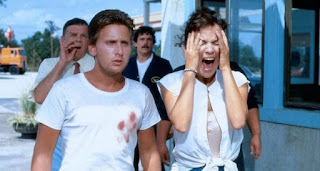In
light of the next “Absolute Horror” column being published in the
upcoming summer issue of Absolute Underground, where I chat for a
while about one of my favourite authors Stephen King, I thought it
might been fun to revisit this piece I wrote about his film, Maximum
Overdrive,
nearly
seven
years ago, which I'd always had fond memories of writing up for the
UK website Videotape Swap Shop – which itself is now long since
defunct.
The article was not as awesome
nor as insightful as I'd remembered it to be. It's still a little
fun, though. And I still hold a lot of gratitude for that now-gone
website, VTSS, which was always quite supportive of my articles.
(Huge thanks to Michael & Hannah)
MAXIMUM
OVERDRIVE
by
Vince D'Amato
(Originally
published December 18, 2011)
Car movies, and especially their more-specific crossover cousin the car/road flicks, are something of specifically American cinema culture, having epitomized its heyday throughout the seventies. Coincidentally, this was also the decade Stephen King had his first novel published. And here's a man who has gleefully mixed America's obsession with the automobile as class status and bullet-fast horror and suspense throughout his career – with the likes of Christine, From a Buick 8, Riding the Bullet, and Dolan's Cadillac just to name a few. When he made his movie deal in the mid-eighties with movie mogul-producer Dino De Laurentiis, It's really no wonder that King figured highways, trucks, and bloody horror would make for a killer directorial debut, and hand-picked his own short story, “Trucks”, as the key concept for his first (and subsequently only) self-directed adaptation of his own literary works.
The
concept of King's original short story, which appears in the short
story collection “Night
Shift”, concerns
a bunch of trucks that suddenly possess homicidal tendencies. In the
film version, this happens after the earth is caught in the tail of a
passing comet, trapping a bunch of truckers, diner staff, and a bible
salesman inside the Dixie Boy Truck Stop Diner, with King here doing
his best (or taking the piss?) while he tries to explain
why
the trucks went mental in the first place, something left out of the
original short story, and something that is usually left out of his
best works. King works incredibly confidently on the what
is happening level,
but in Maximum
Overdrive,
the why
it's happening is
almost gleefully far-fetched, even for a movie where machines
suddenly get brains and start killing any humans they can't trap into
becoming slaves. Speaking of which, how is it that the newlywed
couple were able to keep control of their
vehicle through all this...? Anyway...
With a pretty impressive cast including the reliable Pat Hingle (who easily steals the show), Emilio Estevez, Leon Rippy, Giancarlo Esposito (in one of his earliest minor roles), Lisa Simpson, and King's own discovery, Laura Harrington (What's Eating Gilbert Grape), it's a shame King wasn't able to direct them with the same Americana satire that shines from the characters of his novels. Instead, everyone acts how HE acts in his films (see: CREEPSHOW); mainly, by over-acting to the point where the characters go beyond satire into Looney Tunes. Weirdly, though, this actually all sits pretty well with his over-the-top idea of seeing all the machines in the world suddenly going on a homicidal rampage, and compliments the outrageous style of the movie itself – and there are some truly funny moments, too. Meanwhile, all signs of subtlety are thrown out the window with within the first four seconds of the film, which nicely sets up what we're all in for as an audience.
And as if this weren't all legendary enough, King, ever the rock 'n' roll fan, hired none other than AC/DC to provide the screeching and hyper-catchy soundtrack. But what I want to know is how producer Dino De Laurentiis got King the rights to use the Green Goblin's head on the killer eighteen-wheeler toy delivery truck that's forever known as the cult mascot of this ridiculous but compulsively watchable cartoonish thrill ride. Okay, it's no Shining or Shawshank or Mist or Pet Sematary, but King's cinematic creation has an ingrained warped sense of humor, and the satire does come shining through when the paper-thin walls of the mundaneness and routine of The American Way (circa 1986) come crashing down. Reading too much into this? Nah. It's awesome in its own unique way, it's a film I've watched a dozen times. It's like comfort food. Not really good for you, but damn it, there's just something so satisfying about it anyway. Then again, maybe it's just the exploding toilet paper truck, as if King is yelling at us from behind the camera: Heads up, you're in for a steaming pile of shit, and we're loving it!



























No comments:
Post a Comment